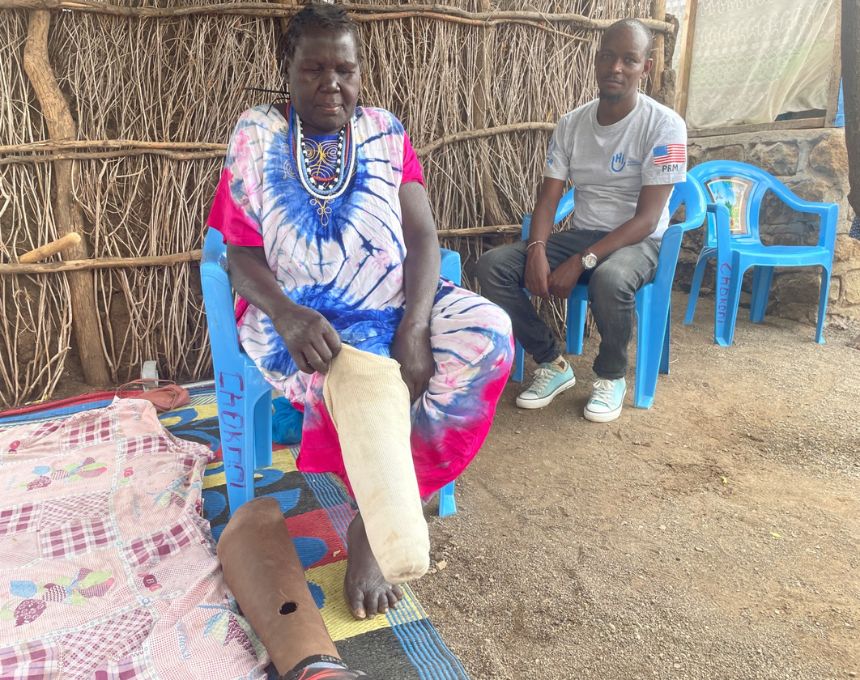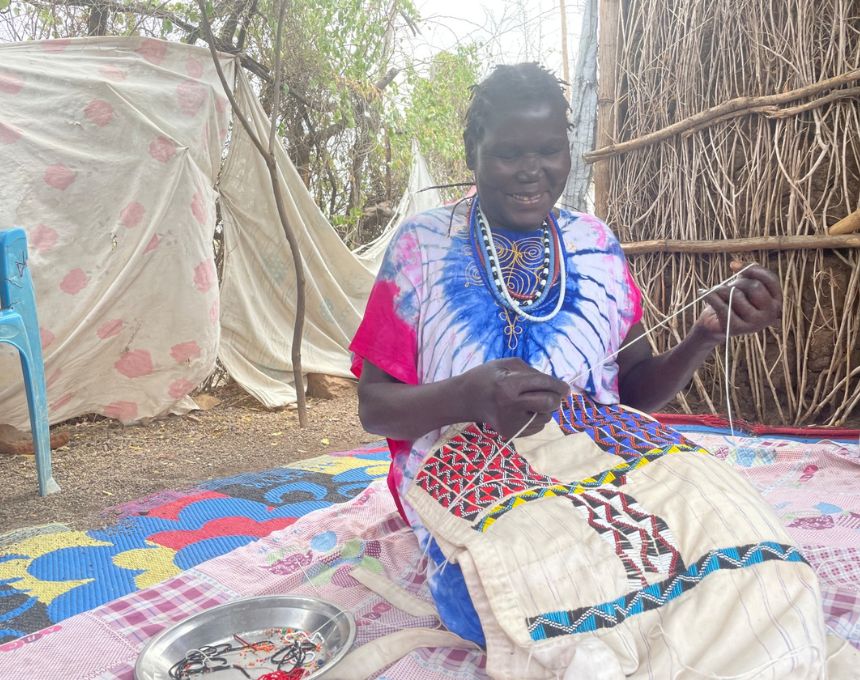hwol sits on a quilt, shaded by a tarp at the back of her home made of natural materials at Kalobeyei settlement in Kenya. A large piece of fabric is draped over her lap, with colorful and intricate patterns of beads that she’s added one by one. She counts each line, picking up the correct bead from the small tin beside her, threading it with a needle and placing it meticulously. Chickens, provided to her family by the World Food Program, peck the ground around her.
The beading is something she brought with her from Ethiopia, her home country that she left more than 10 years ago. Beading is “my culture,” she explains, simply.
Beading keeps Thwol busy. The repetition and creativity are therapeutic. The craft has given her a way to connect with her neighbors and generate income. Beading, along with rehabilitation and psychosocial support from Humanity & Inclusion, helped bring Thwol out of a dark place where she found herself after complications from diabetes required doctors to amputate her leg.

Providing artificial limbs
Thwol was living in Dadaab refugee camp in the eastern part of Kenya, when she began to notice peeling and swelling of her right foot. Humanity & Inclusion’s specialists referred her to a hospital, where her leg was amputated below the knee. She was fitted with crutches and an artificial limb.
When Thwol was moved from Dadaab to Kakuma, another refugee camp in northwestern Kenya, Humanity & Inclusion’s specialists working at both camps communicated to ensure she received follow-up care. By the time Thwol arrived at Kakuma, her crutches were in need of repair and she needed a new artificial limb. Humanity & Inclusion’s team equipped her with new crutches right away, and she was added to the list of people awaiting prosthetics-fitting.
“Humanity & Inclusion is the only organization providing prostheses at the camp,” says Andrew Mwangi, Humanity & Inclusion’s prosthetics and orthotics officer. “The funding is never enough for the need."
Humanity & Inclusion can guarantee new artificial limbs for about 25 people living in Kakuma every year. The process from the time a need is identified to when a person begins walking with their new leg can be long.
"We give people crutches first for walking as we strengthen their muscles of the affected limb, then we do stump-shaping and desensitization before booking them for fitting and gait training,” Mwangi adds.
Children need new artificial limbs every six months or so as they grow, though adults can typically get by with repairs in between necessary replacements.
For Thwol, her artificial leg has given her a sense of independence.
“Before, I could not move from one place to another,” she says. “Now, I can go places, to the market, to church.”

Sense of community
Humanity & Inclusion’s psychosocial support team also works with Thwol, helping her to cope with her disability. Through counseling, Thwol came to realize the importance of channeling her energy into something productive like her beadwork.
“She can use her hands to make beading,” explains Wilkister Nyamweya, Humanity & Inclusion’s psychosocial support officer. “She meets with other women—with and without disabilities—to teach them this craft. It’s given her a sense of belonging and satisfaction.”
Thwol pulls herself across the quilt in her backyard, lifting herself into a chair and strapping into her artificial leg.
“My life has changed,” she says. “With all of the help from Humanity & Inclusion, I have a life now. I’m still alive.”
These activities are funded by the U.S. Department of State Bureau of Population, Refugees and Migration.






